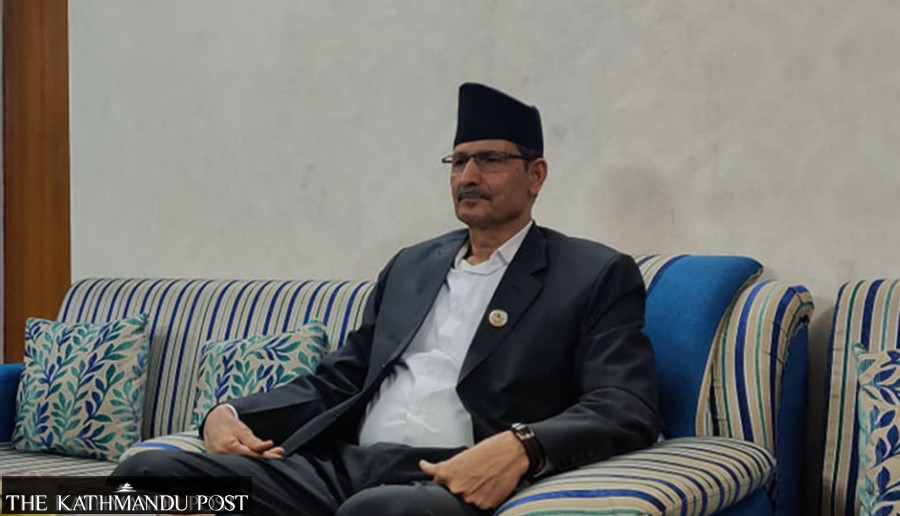National
Can Sapkota be investigated in Spain under principles of universal jurisdiction?
Nepali rights groups demand Spain probe Sapkota over an insurgency-era abduction, killing.
Binod Ghimire
A group of Nepali human rights organisations on Wednesday appealed to the Spanish government to open an investigation into Speaker Agni Sapkota under the principles of Universal Jurisdiction for his alleged involvement in the crimes committed during the Maoist insurgency.
Accountability Watch Group, a network of 24 human rights organisations and victims’ associations in Nepal, said Sapkota must be investigated for his alleged involvement in the abduction and killing of Arjun Lama from Dapcha in Kavrepalanchok district in 2005. Sapkota is in Madrid to participate in the 143rd assembly of the International Parliamentary Union (IPU), an organisation of 179 parliament bodies across the world.
In its letter addressed to IPU President Duarte Pacheco, Spanish foreign minister José Manuel Albares Bueno and Madrid’s envoy to New Delhi and Kathmandu José María Ridao Domínguez, the group said the union and the Spanish government must act on the appeal from Nepal.
Only on Saturday, on the eve of 15th anniversary of the Comprehensive Peace Agreement, signed between then rebel CPN (Maoist) and the government in 2006 which marked an end to a decade-long armed conflict, four international human rights organisations said the perpetrators from the armed conflict could be prosecuted abroad. Issuing a joint statement the Human Rights Watch, the Amnesty International, International Commission of Jurists and TRIAL International said those allegedly responsible for international crimes committed during the conflict remain vulnerable to prosecution abroad under the principle of universal jurisdiction.
“There are enough grounds for Sapkota to be investigated in Spain under the principle of universal jurisdiction,” Charan Prasai, coordinator of the group, told the Post. “Even if it doesn’t happen, we believe, our move will create a pressure to expedite the transitional justice process which is stalled now.” Fifteen years have passed since the peace deal and nearly seven years have completed since the formation of two transitional justice commissions, no significant progress has been made towards providing justice to the thousands of victims of the insurgency.
The human rights defenders and lawyers say war crimes, crimes against humanity, genocide and torture fall under universal jurisdiction. However, the respective countries must have a law in place to prosecute such cases. A report of the Amnesty International shows of 193 member states of the United Nations, 166—86 percent—have such a law in place. However, only 19 countries including Spain have investigated such crimes so far.
Raju Chapagain, a human rights lawyer, said having law alone is not enough, and there have to be complaints against such people in the respective countries and the country must be willing to investigate them. It is not sure if any complaint has been filed against Sapkota in Spain and the group itself is unaware of this.
“The cases of gross human rights violation can be investigated in any country irrespective of where the crime was committed,” said Chapagain. “The jurisdiction generally comes into play when the respective country is unwilling to investigate such cases while also lacking the legal capacity to do so.”
Lama was allegedly killed after abduction and tortured under Sapkota’s direction. Lama was abducted by the cadres of the CPN (Maoist) on April 19, 2005.
The National Human Rights Commission has concluded in its own investigations that Lama was kept under the custody of the then rebel group and was killed after torture. The commission had also directed for the exhumation of his body.
Sapkota was elected House Speaker on January 26 last year when cases against him were sub judice at the Supreme Court. There are three writ petitions pending in the Supreme Court against Sapkota. First, against the Police reluctance to investigate the charges against him, second his appointment as information minister in July, 2012 and third against his appointment as Speaker in January 2020.
The hearings on petitions against him have been deferred for more than 25 times.
Four different international conventions— Geneva Conventions of 1949, the Hague Convention of 1954, Convention against Torture of 1984 and the 2006’s International Convention for the Protection of All Persons from Enforced Disappearance— envision international jurisdiction for such crimes. Under universal jurisdiction any country can investigate and prosecute people suspected of crimes committed outside of the state’s territory.
Earlier, Nepal Army’s Colonel Kumar Lama was arrested by the UK government in January 2013 under its Criminal Justice Act, in connection with incidents that had allegedly occurred between April and May 2005 at the Gorusinghe Army Barracks in Kapilvastu district. He was released in September 2016 after the UK’s government withdrew the cases for lack of evidence.
Human rights defenders say Kapilvastu district court had found Lama’s involvement in torture and he was fined. As there was no law to prosecute torture he didn’t face the legal action. That was a ground for the UK government to arrest him for prosecution. Gauri Pradhan, a former member of the National Human Rights Commission, said the universal jurisdiction doesn’t only have a human rights aspect but also a political aspect attached to it. There was a case against Indian Prime Minister Narendra Modi in the United States in connection with the Gujarat riots when he was chief minister. The US government withdrew the case later.
Similarly, the US government assured non-investigation against CPN (Maoist Centre) Chairperson Pushpa Kamal Dahal in March 2019 before his visit to the US for the treatment of his ailing wife. However, in 2016 he cancelled his travel to Australia fearing that he could be detained there over complaints related to insurgency-era crimes.
“The transitional justice process will never end until the [Maoist] party leadership realises it can have multiple repercussions if left unaddressed,” said Prasai. “We believe our letter will be instrumental in building pressure on the party leadership.”




 13.12°C Kathmandu
13.12°C Kathmandu














